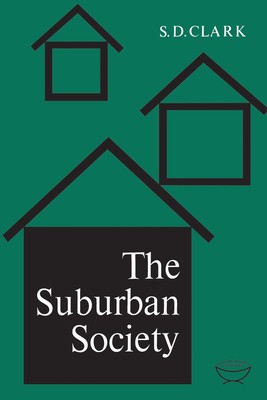
- We will send in 10–14 business days.
- Author: S D Clark
- Publisher: University of Toronto Press
- ISBN-10: 0802060862
- ISBN-13: 9780802060860
- Format: 15.2 x 22.9 x 1.4 cm, minkšti viršeliai
- Language: English
- SAVE -10% with code: EXTRA
Reviews
Description
By questioning the widely accepted picture of suburban society which has been developed by many sociologists, social psychologists, and other serious students of social science, as well as by popular writers, this book will challenge much of our thinking about certain trends and developments in present-day society. The author, a distinguished Canadian sociologist, shows that there is no essential difference between the new society of the suburbs and any other new society in terms of the kind of forces which produced it. The suburban societies so far studied, he maintains, have been selected because they conform to the existing stereotype, and so the myths have been perpetuated.
Professor Clark pays special attention to the mass-developed suburbs. He shows that most suburban dwellers live in areas undergoing mass development, and that in such areas none of the characteristics commonly attributed to suburbia are to be found. The people who have moved to the suburbs in such large numbers are not, the author claims, "other directed" as Riesman would maintain, or "organization men" as Whyte has called them. They were, rather, mainly interested in finding houses to live in, having been forced out of the city in search of living space. By examining a number of suburban areas around Toronto, Professor Clark shows how the suburban society developed from crude beginnings, lacking almost all the attributes of a society, to a society largely urban in character.
EXTRA 10 % discount with code: EXTRA
The promotion ends in 23d.00:58:28
The discount code is valid when purchasing from 10 €. Discounts do not stack.
- Author: S D Clark
- Publisher: University of Toronto Press
- ISBN-10: 0802060862
- ISBN-13: 9780802060860
- Format: 15.2 x 22.9 x 1.4 cm, minkšti viršeliai
- Language: English English
By questioning the widely accepted picture of suburban society which has been developed by many sociologists, social psychologists, and other serious students of social science, as well as by popular writers, this book will challenge much of our thinking about certain trends and developments in present-day society. The author, a distinguished Canadian sociologist, shows that there is no essential difference between the new society of the suburbs and any other new society in terms of the kind of forces which produced it. The suburban societies so far studied, he maintains, have been selected because they conform to the existing stereotype, and so the myths have been perpetuated.
Professor Clark pays special attention to the mass-developed suburbs. He shows that most suburban dwellers live in areas undergoing mass development, and that in such areas none of the characteristics commonly attributed to suburbia are to be found. The people who have moved to the suburbs in such large numbers are not, the author claims, "other directed" as Riesman would maintain, or "organization men" as Whyte has called them. They were, rather, mainly interested in finding houses to live in, having been forced out of the city in search of living space. By examining a number of suburban areas around Toronto, Professor Clark shows how the suburban society developed from crude beginnings, lacking almost all the attributes of a society, to a society largely urban in character.


Reviews